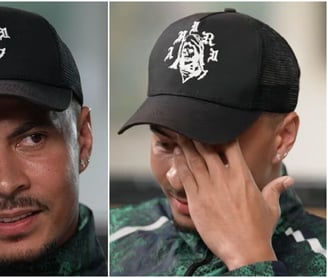See Interview here: https://youtu.be/LyDL9EUIdy0
What Deli has shared will undoubtedly be a catalyst for change in so many people around the world who may connect with elements of his story.
In the 45-minute interview, there is so much to unpack, and a singular article can only comment on a small percentage of what was shared. So I want to zoom in on a word that repeatedly came out throughout the interview: ‘trauma’. Child sexual abuse, complete parental neglect and abandonment, drug dealing, and alcohol abuse… and he’s not even a teenager yet. What Deli went through as a child is unimaginable for many. But I think it’s realistic to suggest that some topics here are not too far away from reality for some players in youth and senior structures here in South Africa.
Trauma is very much a part of life for many in South Africa. Growing up in a township or community where gangs and violence are commonplace means that trauma of some form is very much part of life, and I’d suggest it becomes dispiritingly normalised. Seeing violent crime, being a victim of physical, verbal or sexual abuse, being raised in a home where alcohol or drugs runs the agenda, parental neglect/abandonment, and seeing childhood friends or family get into drugs and gangsterism in early teens is just the start of an endless list of trauma that young people may encounter.
So what does this have to do with football? I want to suggest a lot. Let me give just two reasons why.
The person behind the player
What Deli’s interview revealed is humanity. I’m as guilty as anyone for having my own theory as to why Deli was not performing like his younger days - in reality; I didn’t know, his teammates didn’t know, his managers didn’t know, his loving adopted family didn’t know. We often don’t know the story and life behind the footballer.
As a coach, I’m challenged to better understand and care for the player before the footballer. Deli clearly shows that’s what he needed; at every point in his career, the one constant need was a coach who cared and was interested in how they were doing as human beings first (even though they never truly got to know his backstory).
Trauma and performance
One of the remarkable things I find with Deli’s story is how for many years, his destructive early childhood didn’t prevent him from becoming a world-class player by age 18/19. It’s clear, however, that as he approached 23/24 and started to face a few football battles, the trauma from his childhood now appeared to impact performance - with Deli (and everyone around him) oblivious to the correlation.
I certainly understand that tough childhoods and traumatic experiences can, in some cases, be a catalyst and a drive for success. However, as Deli’s story shows, not addressing trauma means that it’s almost a certainty that performance and healthy function in life will be negatively impacted at some point.
How can the football community respond to trauma?
One of the most inspiring football impact stories for me in Cape Town is what ‘Heideveld Female Football Academy’ is doing. They really understand and face the reality head-on that many of their players have faced violent or sexual abuse and may well face that when they return to their homes after training. A safe house, trauma-informed counselling, and care are core components of what they do.
Most football coaches and administrators will not have the professional background to address such issues raised in this article. Still, the one thing that they do have is the opportunity to guide people to those who do have the resources and expertise to do so. Everton football club have not provided trauma counselling or a rehab program for Deli. They did, however, care enough to listen to him when he was in a dark place and support him in his decision to get help.
High-performance or higher-capacity clubs and academies may well utilise the role of a chaplain or person involved in a setup outside the technical operation and football decision-making process to bridge the players to the support they need. This role can often provide a perceived ‘safer’ outlet for players to easily approach that person and chat about tough personal topics (without fear of the information being mishandled or used against them in selection).
Deli needed Mauricio Pochettino to be on the lookout for him beyond football as he rose to stardom; Deli needed Everton football club to listen to him when his career was nose-diving. Our players in South Africa need coaches who care and clubs willing to look and listen beyond what’s happening on the field.


